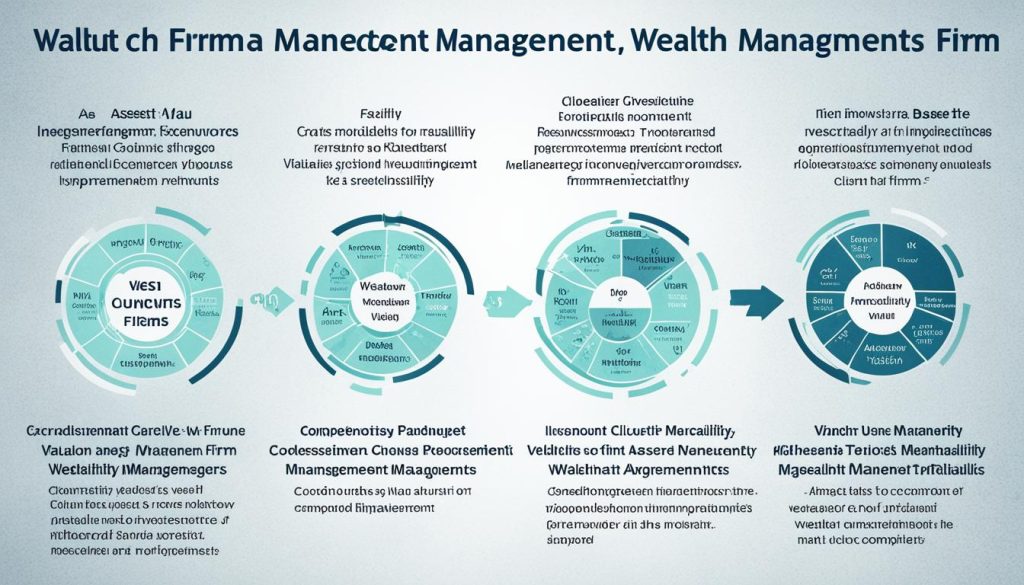When it comes to assessing the worth of a wealth management firm, a strategic approach is crucial. Investors and stakeholders need to consider various factors and utilize effective valuation methods in order to accurately determine the value of a wealth management company. By understanding the key components of wealth management and employing proven strategies, they can unlock the true wealth potential of these firms.
Key Takeaways:
- Determining the value of a wealth management firm requires a strategic approach.
- Wealth management encompasses various components and offers a comprehensive approach to financial services.
- High-net-worth individuals, business owners, and those with complex financial portfolios can benefit from wealth management services.
- Pricing strategies for wealth management businesses can vary based on factors such as complexity of portfolios and level of expertise.
- There are various valuation methods available for determining the worth of a wealth management firm.
Understanding Wealth Management: A Comprehensive Approach
Wealth management is a holistic financial service that aims to optimize an individual’s financial situation. Unlike traditional financial advisor services that focus on specific areas, wealth management encompasses various components such as investment management, financial planning, tax optimization, estate planning, and risk management.
This comprehensive approach sets wealth management apart from traditional financial advisor services and ensures that all aspects of a client’s financial well-being are addressed. By considering multiple areas of expertise, wealth management services offer a more comprehensive and tailored solution to meet the unique needs of each client.
One key distinction between wealth management and financial advisor services lies in the level of integration. While financial advisors primarily focus on specific financial areas, wealth management takes a more interconnected approach. By considering the interplay between various financial components, such as investments, taxes, and estate planning, wealth management professionals can develop a more cohesive and effective financial strategy.
Furthermore, for high-net-worth individuals and families seeking dedicated and comprehensive wealth management, a family office can serve as a valuable solution. A family office functions as a dedicated entity that provides a range of services tailored to the specific needs and complexities of affluent individuals and families. From investment management to succession planning, a family office ensures that all aspects of wealth management are covered.
The Benefits of Wealth Management Services
By utilizing wealth management services, individuals can unlock numerous benefits. Wealth management provides a comprehensive and integrated approach to financial planning, allowing individuals to optimize their investment strategies, minimize tax liabilities, protect and transfer wealth through estate planning, and effectively manage risk.
Through wealth management services, clients gain access to professional expertise and personalized guidance from experienced advisors. These advisors have a deep understanding of the complexities of financial markets, tax regulations, and estate planning, enabling them to develop tailored strategies that align with each client’s unique financial goals and circumstances.
In addition to the technical expertise provided, wealth management services also offer peace of mind. By entrusting their financial affairs to professionals, individuals can confidently navigate the complexities of wealth management, knowing that their financial well-being is in capable hands.
Who Benefits from Wealth Management Services?
Wealth management services offer significant advantages to a wide range of individuals, including high-net-worth individuals, business owners, and those with complex financial portfolios. These individuals often face unique challenges due to their intricate investment structures, diverse assets, and the need for comprehensive financial planning.
The expertise and tailored approach provided by wealth management firms can greatly assist high-net-worth individuals in managing their wealth effectively. By offering personalized strategies and guidance, these services help optimize investment decisions, minimize risks, and ensure long-term financial well-being.
Business owners, on the other hand, can benefit from wealth management services by leveraging their knowledge and expertise to navigate the complexities of both personal and business finances. These services help business owners align their personal financial goals with their business aspirations, ensuring a cohesive and integrated wealth management strategy.
For individuals with complex financial portfolios, wealth management services offer comprehensive solutions to address their unique needs. Managing multiple investment vehicles, diverse assets, and intricate financial structures can be overwhelming. Wealth management professionals provide the necessary expertise and resources to streamline and optimize these portfolios. They help individuals navigate the complexities of tax planning, retirement planning, estate planning, and risk management, ensuring a holistic and integrated approach to wealth management.
“Wealth management services offer personalized strategies and guidance to optimize investment decisions, minimize risks, and ensure long-term financial well-being.”
By availing themselves of wealth management services, high-net-worth individuals, business owners, and those with complex financial portfolios can unlock their financial potential and confidently navigate the intricate landscapes of their finances.

Pricing Strategies for Wealth Management Businesses
When it comes to wealth management services, the cost can vary depending on several factors. These factors include the complexity of financial portfolios, the scope of services provided, and the level of expertise offered by the firm. It’s important for clients to understand the different pricing structures used in the industry.
One common approach is the use of fees. Wealth management firms may charge fixed fees, which are flat rates paid by the client regardless of the assets under management or the performance of the investments. Fixed fees provide transparency and predictability in terms of costs.
Another pricing structure involves commissions. In this model, the wealth management firm charges a percentage-based fee on the assets under management. This fee is typically a percentage of the total value of the client’s portfolio. Commissions are calculated based on the assets under management and can vary depending on the level of service provided.
In addition to fixed fees and commissions, some wealth management firms may also implement performance-based fees, commonly known as performance fees. These fees are tied to the investment portfolio’s performance, and the firm only receives additional compensation if the investments meet or exceed predefined performance targets.
It’s important for individuals seeking wealth management services to discuss the pricing structure with potential firms and inquire about any additional costs or fees that may be involved. By understanding the pricing strategies and fee structures, clients can make informed decisions about their financial management and choose a firm that aligns with their needs and budget.
Key Takeaways:
- The cost of wealth management services can vary based on factors such as the complexity of financial portfolios, the scope of services provided, and the level of expertise offered by the firm.
- Clients can expect to pay fees, commissions, or a combination of both for wealth management services.
- Fixed fees provide transparency and predictability, while commissions are calculated based on the assets under management.
- Performance fees are tied to investment portfolio performance and are only charged if predefined performance targets are met or exceeded.

Whether fixed fees, commission-based fees, or performance fees, it’s crucial for individuals to consider the pricing strategies implemented by wealth management businesses when choosing the right firm for their financial needs.
Valuation Methods for Wealth Management Firms
When determining the value of a wealth management firm, various valuation methods can be utilized. These methods play a crucial role in determining the worth of a wealth management company.
One commonly employed valuation method is the discounted cash flow (DCF) analysis. This method takes into account the firm’s projected future cash flows and discounts them to their present value. By assessing the firm’s cash flows and growth prospects, investors can estimate its current worth.
Another method is the comparable company analysis, which involves comparing the firm to similar wealth management companies in terms of size, services offered, and client base. By examining market comparables, investors can gain insights into the value of the firm.
The excess earnings method is another widely used valuation technique. This method calculates the value of a wealth management firm based on the excess earnings it generates above a specified rate of return. It considers both tangible and intangible assets, such as the firm’s brand reputation and client relationships.
When conducting a valuation, it is important to consider various factors such as the firm’s current and projected cash flows, growth potential, market comparables, and intangible assets. By using these valuation methods, investors and stakeholders can make more informed decisions about the value of a wealth management firm, enabling them to navigate the industry with confidence.
Valuation methods are essential tools for determining the worth of a wealth management firm. By considering factors such as cash flows, growth prospects, market comparables, and intangible assets, investors can gain a comprehensive understanding of the firm’s value.

Determining the value through discounted cash flow (DCF) analysis
- Estimate the firm’s projected future cash flows.
- Apply a discount rate to these cash flows to determine their present value.
- Sum up the present values of the projected cash flows to estimate the firm’s overall value.
Using the comparable company analysis method
- Identify similar wealth management firms in terms of size, services offered, and client base.
- Analyze the financials of these comparable companies.
- Compare the firm’s financials to those of the comparable companies to assess its relative value.
Applying the excess earnings method
- Determine the firm’s return on tangible assets.
- Calculate the excess earnings by subtracting a specified rate of return from the firm’s actual earnings.
- Determine the present value of these excess earnings.
- Sum up the present value of the excess earnings with the value of the firm’s tangible assets to estimate its overall value.
By employing these valuation methods, investors can gain valuable insights into the worth of a wealth management firm and make informed decisions regarding their investments and partnerships.
Factors Influencing the Value of a Wealth Management Firm
Valuing a wealth management firm involves considering various factors that can influence its worth. These factors encompass the firm’s client base, assets under management (AUM), revenue streams, reputation, track record, and the expertise of its advisors. Additionally, market conditions, regulatory requirements, and industry trends also play a significant role in determining the value of a wealth management firm.
“The quality and size of a wealth management firm’s client base are crucial factors in determining its value. A diverse and loyal client base indicates the firm’s ability to attract and retain clients, which can contribute to stable revenue streams and future growth prospects,”
Furthermore, the firm’s AUM is another critical aspect that impacts its value. A higher AUM signifies the trust and confidence clients have in the firm’s ability to manage their wealth effectively. Additionally, a larger AUM can provide stability and scalability, enabling the firm to grow and expand its offerings.
The revenue streams of a wealth management firm also play a significant role in determining its value. A diversified revenue stream, including management fees, performance fees, and other sources of income, can contribute to the firm’s stability and profitability. On the other hand, a heavy reliance on a single source of revenue may pose risks and affect its valuation.
Expertise and Experience of Advisors
The expertise and experience of the firm’s advisors are essential considerations when evaluating its value. Skilled and experienced advisors can provide superior advice, generate higher investment returns, and effectively navigate complex financial situations for clients. Their expertise contributes to the firm’s reputation and track record, which can attract new clients and retain existing ones.
Moreover, market conditions, regulatory requirements, and industry trends must also be taken into account when assessing the value of a wealth management firm. These external factors can impact the firm’s performance, growth potential, and compliance with regulations. A firm that can adapt and thrive in changing market conditions may be perceived as more valuable.
To summarize, the value of a wealth management firm is influenced by factors such as its client base, AUM, revenue streams, reputation, expertise and experience of advisors, market conditions, regulatory requirements, and industry trends. Analyzing these factors is essential for stakeholders seeking to understand the worth of a wealth management firm and make informed decisions.

Assessing the Worth of a Wealth Management Firm
When it comes to assessing the worth of a wealth management firm, stakeholders have several key factors to consider. One crucial aspect is analyzing the firm’s financial statements, including its revenue, expenses, and profitability. These financial indicators provide valuable insights into the firm’s financial health and overall performance.
However, financial statements alone do not tell the complete story. Other metrics, such as the client retention rate, are essential in evaluating the firm’s value. A high client retention rate indicates client satisfaction and loyalty, which are indicators of a firm’s strong relationship with its clients.
“The client retention rate is an important metric for assessing the worth of a wealth management firm. It demonstrates the firm’s ability to retain its clients and build long-term relationships based on trust and satisfaction.”
In addition to financial statements and client retention rate, stakeholders should also take into account the firm’s reputation within the industry. A firm with a positive reputation and a track record of successful wealth management services is likely to be valued higher than its competitors.
To ensure a comprehensive assessment, stakeholders must perform due diligence and conduct thorough market research. This involves analyzing industry benchmarks and comparing the firm’s performance and value against other wealth management firms.

By considering these multiple factors and utilizing a holistic approach, stakeholders can make a more accurate assessment of a wealth management firm’s worth. This enables them to make informed decisions and align their investment strategies with their financial goals.
Conclusion
Valuing a wealth management firm is a complex process that requires a comprehensive approach and the utilization of proven appraisal techniques. By understanding the key components of wealth management, accurately assessing the firm’s worth through thorough financial analysis and market research, and considering industry benchmarks, investors and stakeholders can make informed decisions and successfully navigate the wealth management landscape.
When determining the value of a wealth management firm, it is crucial to analyze various factors, including the firm’s client base, assets under management, revenue streams, reputation, and the expertise and experience of its advisors. These factors, along with market conditions and regulatory requirements, greatly influence the firm’s overall worth.
Successful valuation also involves diligent examination of the firm’s financial statements, such as revenue, expenses, and profitability, as well as other metrics like client retention rate and client satisfaction. These insights provide a more accurate assessment of the value of the wealth management firm.
Ultimately, by adopting a comprehensive and thorough approach to valuing a wealth management firm, stakeholders can make more accurate assessments, enabling them to make informed decisions about investments and partnerships in the ever-evolving wealth management industry.




No comments! Be the first commenter?